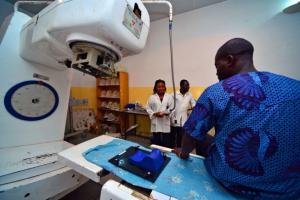IAEA Partners with IFPMA to Tackle Global Cancer Epidemic
Ahead of World Cancer Day, the International Atomic Energy Agency (IAEA) and the International Federation of Pharmaceutical Manufacturers and Associations (IFPMA) on 3 February signed an agreement to train health professionals and boost cancer control efforts in low- and middle- income countries, where many people lack access to basic cancer diagnosis and treatment services.

The IAEA Programme of Action for Cancer Therapy supports low and middle income countries in the implementation of comprehensive national cancer control programmes.
The collaboration will initially focus on stepping up the IAEA’s Virtual University for Cancer Control (VUCCnet). This e-learning platform provides health professionals with customized, high-quality and free training across all stages of cancer care. After a successful pilot phase that trained 500 African health professionals – estimated to have benefited 10,000 cancer patients in Ghana, Uganda, Tanzania and Zambia – VUCCnet is planned to be extended to 33 sub-Saharan African countries.
“Building skills within the health workforce is vital in order to provide adequate, quality cancer care,” said Nelly Enwerem-Bromson, Director of the IAEA’s Programme of Action for Cancer Therapy. “This partnership helps us to create bridges with the private sector to increase life-saving investments in cancer control for most affected countries.”
Globally, cancer kills more than 8.2 million people every year – more than HIV/AIDS, tuberculosis and malaria combined. Low- and middle- income countries (LMICs) bear the brunt of the cancer burden. The International Agency for Cancer Research (IARC) reports that over half of new cancer cases occur in these countries, and estimates that this could rise to 60 per cent by 2020. LMICs, however, have only 5 per cent of the total global resources available to them to provide cancer care services.
Demographic and lifestyle changes, coupled with poor or non-existent cancer control infrastructure and a shortage of a properly trained health workforce, make the situation more urgent.
"We are delighted to support the IAEA in strengthening cancer control knowledge and training capacity in LMICs," said Thomas Cueni, IFPMA Director General. “Through focused programmes like the VUCCnet, we help catalyze new partnerships and advance the resources and knowledge needed to enable countries to reverse the increasing burden of non-communicable diseases,” he added.
The IAEA estimates that over 5,000 radiotherapy machines will be required in LMICs to meet the current demand for cancer care. In addition to this essential equipment, 10,000 additional radiation oncologists, 6,000 medical physicists, 3,000 dosimetrists and 20,000 radiation therapists would be required for adequate care.
The new collaboration will help the IAEA engage in public-private partnerships to mobilize resources for cancer control projects. It also foresees support for a joint project between the IAEA, the World Health Organization and the IARC to help countries devise and implement targeted cancer control programmes.
source: International Atomic Energy Agency
- 321 reads
Human Rights
Ringing FOWPAL’s Peace Bell for the World:Nobel Peace Prize Laureates’ Visions and Actions

Protecting the World’s Cultural Diversity for a Sustainable Future

The Peace Bell Resonates at the 27th Eurasian Economic Summit

Declaration of World Day of the Power of Hope Endorsed by People in 158 Nations

Puppet Show I International Friendship Day 2020

